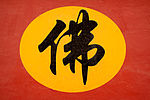A Japanese edition of the Chinese Buddhist canon
| Part of a series on |
| Chinese Buddhism |
|---|
 |
| History |
Major figures
|
| Traditions |
| Texts |
| Architecture |
| Sacred Sites |
| Culture |
The Taishō Tripiṭaka (Chinese: 大正新脩大藏經; pinyin: Dàzhèng Xīnxīu Dàzàngjīng; Japanese: Taishō Shinshū Daizōkyō; lit. "Taishō Revised Tripiṭaka") is a definitive edition of the Chinese Buddhist canon and its Japanese commentaries used by scholars in the 20th century. The Taishō Tripiṭaka project was initiated by the Department of Sanskrit and Indian Studies at Tokyo Imperial University. It was edited by Takakusu Junjiro and others.
The name is abbreviated as "大正藏" in Chinese (Dàzhèngzàng) and Japanese (Taishōzō).
Contents
Volumes 1–85 are the literature, in which volumes 56–84 are Japanese Buddhist literature, written in Classical Chinese. Volumes 86–97 are Buddhism related drawings, includes drawings of many Buddhas and bodhisattvas. Volumes 98–100 are texts of different indexes of Buddhist texts known in Japan ca. 1930. The 100 volumes of literature contains 5,320 individual texts, classified as follows.
| Volume | Order | Name | Chinese | Japanese | Sanskrit | Description |
| T01–02 | 1–151 | 阿含部 | Āhán bù | Agon-bu | Āgama | Āgama Section |
| T03–04 | 152–219 | 本緣部 | Běnyuán bù | Hon'en-bu | Jātaka | Birth Stories |
| T05–08 | 220–261 | 般若部 | Bōrě bù | Hannya-bu | Prajñapāramitā | Perfection of Wisdom |
| T09a | 262–277 | 法華部 | Fǎhuá bù | Hokke-bu | Saddharma Puṇḍarīka | The Lotus Sūtra |
| T09b–10 | 278–309 | 華嚴部 | Huáyán bù | Kegon-bu | Avataṃsaka | Flower Garland |
| T11–12a | 310–373 | 寶積部 | Bǎojī bù | Hōshaku-bu | Ratnakūṭa | Jewel Peak |
| T12b | 374–396 | 涅槃部 | Nièpán bù | Nehan-bu | Nirvāṇa | The Parinirvāṇa |
| T13 | 397–424 | 大集部 | Dàjí bù | Daishū-bu | Mahāsannipāta | The Great Collection |
| T14–17 | 425–847 | 經集部 | Jīngjí bù | Kyōshū-bu | Sūtrasannipāta | Collected Sūtras |
| T18–21 | 848–1420 | 密教部 | Mìjiào bù | Mikkyō-bu | Tantra | Esoteric Teachings |
| T22–24 | 1421–1504 | 律部 | Lǜ bù | Ritsu-bu | Vinaya | Monastic Discipline |
| T25–26a | 1505–1535 | 釋經論部 | Shìjīnglùn bù | Shakukyōron-bu | Sūtravyākaraṇa | Sūtra Explanations |
| T26b–29 | 1536–1563 | 毗曇部 | Pítán bù | Bidon-bu | Abhidharma | Systematic Analyses |
| T30a | 1564–1578 | 中觀部類 | Zhōngguān bùlèi | Chūgan-burui | Mādhyamaka | Mādhyamaka Texts |
| T30b–31 | 1579–1627 | 瑜伽部類 | Yújiā bùlèi | Yuga-burui | Yogācāra | Yogācāra Texts |
| T32 | 1628–1692 | 論集部 | Lùnjí bù | Ronshū-bu | Śāstra | Treatises |
| T33–39 | 1693–1803 | 經疏部 | Jīngshū bù | Kyōsho-bu | Sūtravibhāṣa | Sūtra Clarifications |
| T40a | 1804–1815 | 律疏部 | Lǜshū bù | Rissho-bu | Vinayavibhāṣa | Vinaya Clarifications |
| T40b–44a | 1816–1850 | 論疏部 | Lùnshū bù | Ronsho-bu | Śāstravibhāṣa | Śāstra Clarifications (sub-commentaries) |
| T44b–48 | 1851–2025 | 諸宗部 | Zhūzōng bù | Shoshū-bu | Sarvasamaya | Sectarian Teachings (Nichiren etc.) |
| T49–52 | 2026–2120 | 史傳部 | Shǐchuán bù | Shiden-bu | Histories | |
| T53–54a | 2121–2136 | 事彙部 | Shìhuì bù | Jii-bu | Cyclopedia | |
| T54b | 2137–2144 | 外教部 | Wàijiào bù | Gekyō-bu | Non-Buddhist Texts (Hinduism, Taoism, Manichaeism, Nestorianism, etc.) | |
| T55 | 2145–2184 | 目錄部 | Mùlù bù | Mokuroku-bu | Catalogues | |
| T56–83 | 2185–2700 | 續經疏部 | Xùjīngshū bù | Zokukyōsho-bu | Additional Sūtra Clarifications (influential Japanese sub-commentaries) | |
| T84 | 2701–2731 | 悉曇部 | Xītán bù | Shittan-bu | Siddhaṃ | Siddhaṃ Script (esoteric script imported to Japan by Kūkai) |
| T85a | 2732–2864 | 古逸部 | Gǔyì bù | Koitsu-bu | Ancient | |
| T85b | 2865–2920 | 疑似部 | Yísì bù | Giji-bu | Doubtful | |
| T86–97 | 圖像部 | Túxiàng bù | Zuzō-bu | Illustrations (exegesis of standard Buddhist imagery, with inserts) | ||
| T98–100 | 昭和法寶 總目錄 |
Zhāohé fǎbǎo zǒngmùlù |
Shōwa Hōbō Sōmokuroku |
Shōwa Treasures of the Faith (catalogs of scripture collections and canon editions) | ||
Digitalization
The SAT Daizōkyō Text Database edition contains volumes 1–85. The Chinese Buddhist Electronic Text Association (CBETA) edition contains volumes 1–55 and 85. The Fomei edition (佛梅電子大藏經) contains texts in Classical Chinese other than Nichiren Buddhism.
Volumes 56–84, although they were written in Classical Chinese, were composed by Japanese Buddhist scholars.
Notes
- Takakusu, Junjirō; Watanabe, Kaigyoku, eds. (1962) . The Taisho shinshu daizokyo (100 volumes) (first ed.). Tokyo: Taisho shinshu daizokyo kanko kai.
- Wilkinson, Greg (2016). "Taishō Canon: Devotion, Scholarship, and Nationalism in the Creation of the Modern Buddhist Canon in Japan". In Wu, Jiang; Chia, Lucille (eds.). Spreading Buddha's word in East Asia: the formation and transformation of the Chinese Buddhist canon. New York: Columbia University Press. p. 295.
- 世界第一部漢文電子大藏經《佛梅電子大藏經》珍藏版
Bibliography
- Matsumoto, T. (1934), "Taishō Shinshū Daizōkyō oder kurz "Taishō Issaikyō"", Zeitschrift der Deutschen Morgenländischen Gesellschaft 88 (n.F. 13), No. 2, 194-199
External links
- The SAT Daizōkyō Text Database at the University of Tokyo
- Chinese Buddhist Electronic Text Association (CBETA)
- NTI Buddhist Text Reader
- 中國傳統佛教資料下載
- 佛教電子書
- 大正大藏經 【大正藏網頁版】
- Bukkyo Dendo Kyokai Japan provides some English translations (pdf) from the BDK English Tripitaka series.
- Bibliography of Translations from the Chinese Buddhist Canon into Western Languages
- Chinese-English Tripitaka with All Titles and Known Translations in English